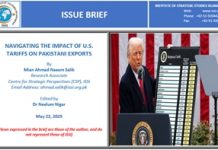In efforts to regulate Artificial Intelligence (AI) technologies, the 78th session of the United Nations General Assembly (UNGA) unanimously adopted a resolution on “Enhancing International Cooperation on Capacity-building of AI” that was proposed by China and co-sponsored by more than 140 countries. The resolution aims to enhance international cooperation in the capacity building of AI.[1] The combined efforts were made to shape the future of AI technologies by ensuring secure developments and deployments.[2] The resolution advocates for AI development in a free, open, inclusive, and non-discriminatory environment between developed and developing nations. History has demonstrated that states are constantly striving to enhance their security measures in response to evolving paradigms, including the arms race to acquire developed weapons, aircraft, and technologies, as well as the development of weapons of mass destruction (WMDs) and the competition for advanced weaponry.[3] This constant competition has undoubtedly put the element of human security at risk and has been progressing only from a realist perspective. Similarly, as new technologies emerge, the realm of warfare continues to evolve, potentially negating human security in the pursuit of artificial intelligence advancement.[4]
Home ISSI Publications Articles Issue Briefs Issue Brief on “China-Led Resolution on Artificial Intelligence: Prospects for Human Security...















